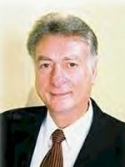DoctorsThree.jpg

Photo by Cathy Yeulet, ©2016 / 123rf.com
Health providers in America who rely on "natural" methods can be divided into three groups.
GROUP 1: The largest of the three groups. This group is disturbed about the effectiveness of drugs and their side effects. The doctor in this group has gone "natural." He is still thinking in terms of disease and a "potion" for a symptom or condition. This is the doctor who does not use Coumidin for blood clotting but uses vitamin E or herbal combinations to keep the blood thin. He does not use antibiotics but uses vitamin C or herbal mixtures for infections. He is still locked into traditional thinking and thinks only in terms of disease treatment. He is always looking for the "quick fix." He is not aware of prevention, optimum health or body chemistry balance. He is usually very conservative and often fails to give enough supplementation for adequate treatment. He is dissatisfied with his results but consoles himself by thinking, "at least I'm not giving harmful chemicals with side effects – I'm not hurting my patient!"
GROUP 2: These are the research-oriented people. They are willing to study hard, delve into the biochemistry of the body and take extreme measures to prove or disprove their concepts. They are the ortho-molecular clinicians who give mega-dosages of biochemical components. They use large amounts of natural substances to get drug-like responses. They fully understand the extent of the malnutrition in our society and often treats patients as if they were laboratory subjects, often jumping from one mega-dose to another in his search. They are somewhat successful and often "get results" when every other form of orthodox and non-orthodox treatment has failed. They are fairly well satisfied with themselves and spend as much time as possible in study of biochemical processes of the human body. They often treat to manipulate laboratory result numbers rather than look at the whole person. They are often at a loss of "what to do" if all laboratory levels fall in the normal levels.
GROUP 3: This group is composed of a small number of practitioners. Here are the "real" doctors. These practitioners realize the incredible complexity of the human organism and cannot conceive of the disease-symptom treatment philosophy. They cannot "buy" treating a disease with a drug or a vitamin. They must understand why the condition developed and understand the intricate biochemical reactions to it. They are never satisfied until the body chemistry is in perfect balance and try to educate their patients to keep this balance current. Group 3 clearly understands their limitations. But through diet, supplementation, education, etc., develop the body to its highest level of function providing both health care and education. These properly built-up and balanced patients respond remarkably well to skillfully applied specific therapy whenever indicated. These are the true physicians going far past the "quick-fixers" and "alternative researchers."
In giving nutritional advice we must get away from the idea of giving a specific vitamin or combination thereof for a specific disease. We all would like to be able to take every case of, say, arthritis, or cancer ,and give the magic combination of supplements and foods and obtain an instant cure. What we must do is examine the physiology of the person with cancer, arthritis, or any disease for that matter, and seek to strengthen the parts of the, body that are not functioning properly. Whatever the so-called disease label or symptomatic complex, we must relate back to the specific physiology and anatomy of the individual. In summary, we should think in terms of pancreatic function and efficiency, adrenal function and efficiency, liver function and efficiency, etc. – not in terms of hypoglycemia, Addison's disease, gout, cancer or other symptom or pathology diagnosis.
The body constantly functions by series of chain reactions. The various systems of the body do not function interdependently. Nor do diseases with localized symptoms have a strictly local, independent origin or effect. Therefore, it is less than scientific to treat a disease state as if it were confined solely to a single area or a single system within the body. Attempts to do this may seem to work, but ultimately they afford little but temporary benefit.
You are healthy when everything works.
About one hundred trillion cells make up the human body. By the time you have read this sentence over one million, three hundred fifty thousand cells will be formed in your body – part of the one billion cells made each hour. Each cell in itself is far more complicated than the most intricate electronic computer.
We have isolated about 50 nutritional substances the body must have regularly to maintain growth development and a normal healthy condition. In addition there are unidentified substances in foods, which are known to be of value. This human chemical complex of ours takes in air, water and food and, through millions of biochemical and bioelectrical reactions, produces and continues our life.
It is a matter of genetics that like reproduces like. Our children look like us. They have many of the same weaknesses and strengths as us. As individual cells replace themselves they do so with another like the parent cell. Thus an efficient cell will replace itself with another insufficient cell, unless something is done to change the chemistry of the cell. It is estimated that within the genetic code of each cell there are about 24,000 to 25,000 memory units. The cell has the memory of how to produce a healthy cell if all the raw materials are present in a utilizable form. The genetic code need not be changed – with all possible nutrients supplied in the right balance and in the right form, each cell can develop to its optimum efficiency within its genetic framework.
In seeking to supply all possible nutrients on the cellular level, we need to work from three directions – substitution, stimulation and support. We must first, with our supplementation, provide substitution for what the body cannot provide for itself. For example, if the stomach is not producing the right levels of hydrochloric acid we must substitute by providing hydrochloric acid. We may want to provide vitamin B-12 or other B vitamins to stimulate liver functions. We may provide support for certain organs with glandular extracts. In making these three provisions, we should have available any requirement needed to produce an increasingly more healthy cell with each successive generation
When the cellular health improves to the level of normal functioning efficiency, we no longer need substitution and stimulation. A normally functioning cell should be producing the right secretions, etc., whenever called for. We may, for a longer period of time, continue with supportive nutrients depending on the patient's willingness to follow a supporting diet and stay away from energy depleting foods.
If a person has an illness or a disease, we can assume it is because some part of the body is not functioning as it should. If functions carry on normally, there should be no disease. We are healthy when everything works! Our main interest should be in examining the body to find the area of depressed function – not in examining the body to find a disease we can label with a specific name. Our area of treatment should be toward strengthening the weak function rather than introducing some entity to counteract a disease.
Normally by the time a person seeks nutritional counseling, he is well aware that his body chemistry is "out of balance." By the time he finds adequate qualified guidance he has often gone through a long period of self-help, lay guidance, fad diets, massive vitamin-mineral intake, self education programs, a period of extreme depression, and finally a state of total confusion.
To be successful, any practitioner must pay attention to building his patients' bodies to a level sufficient to which he can then practice his highly-skilled training, be it surgery, pharmacy, dentistry, chiropractic, homeopathy, herbology, or any host of life-assisting procedures.
In many instances, proper nutritional guidance is enough to create health. In malfunction of long standing deficiencies or widespread diseases, specific intervention may be required. If surgical, chemical intervention or other specific intervention is required; health will not be created without a base of proper nutrition.
Remember, you are healthy when every part of your body works as it should!


